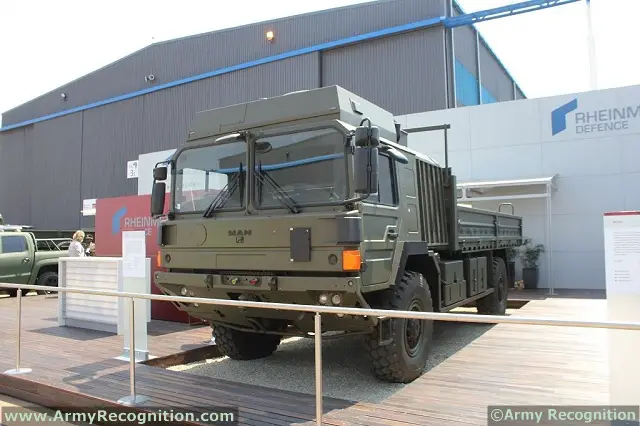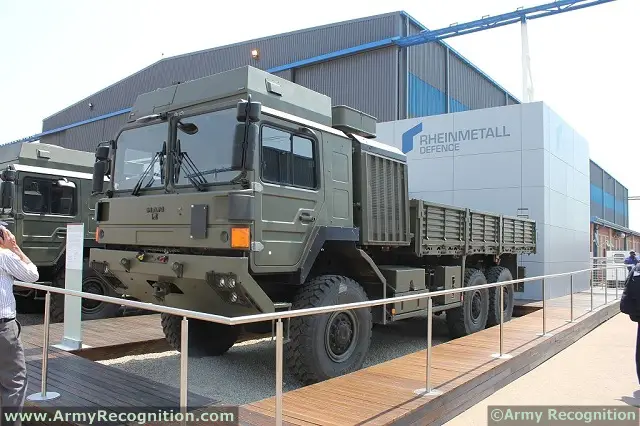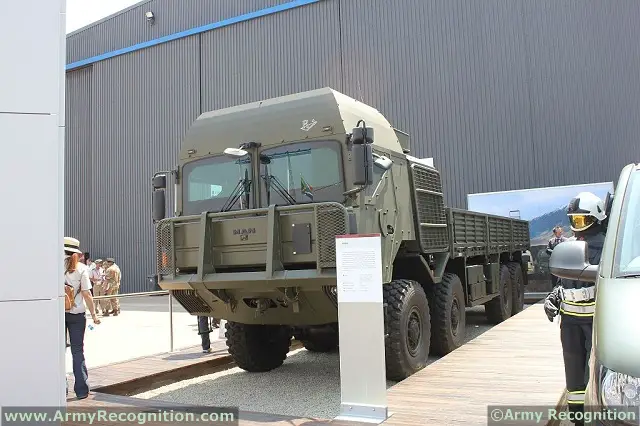No
logistics, no tactics: now more than ever, today’s fast-moving armies
need to be sure that their supplies keep rolling too. Contemporary asymmetric
conflicts lack clearly defined front lines, confronting commanders and
manufacturers of modern transport, command and multi-mission vehicles
with new requirements regarding mobility, robustness, functionality, survivability
and lethality. The systems of the HX family, made by Rheinmetall MAN Military
Vehicles (RMMV), number among the most cost-effective and operationally
proven in their class.
At AAD 2012 held at Waterkloof Air Force Base in Pretoria RMMV is displaying
several different configurations from its pure military logistical HX
series of vehicles. These include the HX60 (4x4), the HX58 (6x6) and the
HX77 (8x8). |
A
match for modern mission scenarios
All HX vehicles are “military off the shelf” (MOTS) products
specially developed for military applications. Their main priority is
extreme mobility and reliability even in the harshest terrain.
Unlike many other comparable vehicles, the HX family is made up entirely
of off-the-shelf (OTS) components. It combines tried-and-tested components
from major commercial vehicle series – such as the low-torsion ladder
frame from MAN’s civilian TG line of vehicles – with technology
specially designed to meet the needs of the military, such as advanced
leaf spring suspension, extreme fording capabilities and multi-fuel engines.
Right from the start, these trucks are designed not merely for greater
durability, payload capacity and on- and off-road mobility, but also to
operate at temperatures ranging from -32 to +49° C. Moreover, they
can be equipped with protective modules and/or weapon stations for self-defence
without major modification.
As a MOTS product family, RMMV’s HX vehicles not only feature outstanding
mobility, protection and reliability, they also display maximum modularity
and interoperability. Systematic, system-oriented thinking is evident
throughout.
This results in total ease of use as well as streamlined logistics and
maintenance, since many components and assemblies of the vehicle family
are centrally produced
and fully interchangeable. In the UK, the net effect has been to reduce
a previous logistic vehicle parts inventory stock of 30,000 lines to less
than 7,000.
Operation of the vehicles is largely identical. The same applies to maintenance
and repair of the vehicles, engines and drive trains. This produces considerable
synergy effects when it comes to training crews and mechanics as well
as substantially simplifying logistics for the entire fleet of vehicles.
The multi-fuel capability and excellent supply arrangements (all maintenance
significant spare parts are NATO codified) are further important features
of the HX family, which Germany’s Rheinmetall Group – one
of the oldest and most trusted names in the global defence industry –
is presenting at the AAD exhibition 2012 in Pretoria, along with a wide
array of other products and technologies designed for today’s expeditionary
focussed armed forces.
If required, all of these vehicles can be either equipped with a modular
armoured cabin (MAC) or a fully integrated armour cabin to meet the highest
STANAG or Mil-Standard specifications with regard to ballistic and mine
protection. Installation of the MAC takes only six to eight hours, and
can be performed by two trained technicians with the help of a forklift. |
The
4x4 class: HX 60
In the 4x4 class, RMMV’s answer is the HX60. The vehicle is powered
by a water-cooled 6-cylinder MAN D0836 diesel engine with direct fuel
injection and output of 240 kW or 326 hp. If absolutely identical parts
and total interoperability are required, the larger D2066 engine from
the 6x6 or 8x8 is available as an alternative. Measuring 7.44 metres in
length, the standard version of the vehicle is extremely mobile in all
types of terrain. Capable of attaining a top speed of more than 90 km/h,
it features 60% gradeability and a step climbing capability of half a
metre. Furthermore, it can cross 1.20-wide ditches and has a 0.75 metre
fording capability, which can be increased to 1.50 metres in accordance
with customer requirements. Its total authorized gross vehicle weight
is 18 tons, with a military payload of six tons.
Among others Rheinmetall has designed a troop carrier version of this
vehicle. Along with a three-man crew, it can seat twenty infantrymen back-to-back,
assuring optimum observation and engagement of enemy targets. Furthermore,
the vehicle can be equipped with dropsides at the rear and to the sides. |
The
6x6 class: HX 58
The HX 58 is powered by a 6-cylinder MAN D2066 diesel engine with direct
fuel injection. With a cubic capacity of 10,518 cm³, its output comes
to 324 kW (440 hp). Measuring 8.68 metres in length, the vehicle attains
top speeds in excess of 90 km/h. Its superb off-road manoeuvrability corresponds
to the HX 60. The vehicle’s maximum permissible weight is 27.5 tons,
with a military payload of nine tons. This makes the HX 58 a universal,
highly mobile transport vehicle. Like all RMMV vehicles, the HX 58 is
also available with a modular armour cabin (MAC) or integrated armour
cabin (IAC) for maximum Class 3 ballistic protection and Class 3b anti-mine
protection in accordance with NATO STANAG 4569.
The 8x8 class: HX 77 and HX 81
The HX 77 has the same MAN D2066 powerpack as the HX 58. The IAC meets
NATO STANAG 4569 criteria, providing the crew with excellent protection
from ballistic threats, landmines and IEDs. In terms of mobility, it exceeds
all other vehicle classes, and is capable of crossing trenches up to 2.40
metres in width.
The vehicle is 10.27 metres long and has a maximum authorized weight of
40 tons, with a military payload of 15 tons. Thanks to its container handling
unit (CHU) and/or hook lift system, the HX 77 is the perfect armoured
transport vehicle for carrying 20 ft. ISO containers or flats, which today
form the backbone of military and civilian logistics.
The HX 81 is powered by an MAN D2868 8-cylinder diesel engine with direct
fuel injection. With cubic capacity of 16,160 cm³, the engine has
a 500 kW (680 hp) output. In terms of off-road mobility, the HX 81 essentially
matches the performance of the HX 77. The vehicle is designed to serve
either as a semi-trailer or tank transporter; it has a maximum authorized
gross train weight of 130 tons. This means that it can in combination
with a suitable trailer carry modern main battle tanks across rough terrain.
Deployed around the world for decades and battle proven
The origins of the X family lie in the 1970s, when the German Bundeswehr
procured a follow-on generation of trucks. Deployed during the Cold War
and steadily perfected, several thousand of these transport and mission-specific
vehicles are still in regular service with the German Bundeswehr to this
day – a mere fraction of the more than 60,000 X systems now operated
by over fifty nations worldwide. All along, the X family has kept pace
with the changing requirements of the Bundeswehr, accompanying its transition
from territorial defence army to strategic intervention force. In Somalia,
the Balkans and Afghanistan, the high-mobility “mil gl” truck
category – Bundeswehr shorthand for “military, all terrain”
– forms the backbone of German Army tactical logistics.
The military-off-the-shelf concept of the HX family remains as compelling
as ever. As such they are the logistical backbone of numerous armies in
the world, where they are put to the test in thousands on a daily basis.
In 2007 the British armed forces began receiving the first of over 7,000
HX family vehicles, including 4x4, 6x6 and 8x8 versions. These transport,
tanker and recovery vehicles are replacing the old Leyland and Bedford
trucks as well as the Foden recovery vehicles, which the SX 45 (8x8) vehicle
family is superseding.
Her Majesty’s Armed Forces have been deploying HX and SX vehicle
families in Afghanistan and previously Iraq since early 2008. The response
from all levels has been extremely positive.
During Operation Herrick 9 in February 2009 in Afghanistan, the new Support
Vehicle (Recovery) successfully went into action for the first time, recovering
a severely damaged Warrior 514 armoured fighting vehicle, towing it 75
kilometres over 18 hours through enemy dominated territory performing
very impressively throughout. In the words of one Warrant Officer Class
2: “For the first time in my career I have a protected vehicle with
a radio that actually works and electronic countermeasures against remotely
detonated improvised explosive devices. We were even able to tow several
damaged vehicles in a convoy – at times even two casualties behind
every recovery vehicle – 150 km across the desert with no problem.”
The British are equally enthusiastic about the HX77 8x8 Enhanced Pallet
Loading System (EPLS), which the UK procured in response to an Urgent
Operational Requirement. Unlike the previously deployed Leyland and Foden
Demountable Rack Offload & Pickup System (DROPS), this protected vehicle
can handle traditional flatracks or lift a 20-foot ISO container weighing
up to 15 tons in just minutes thanks to its Container Handling Unit (CHU).
As the commander of a British logistics brigade puts it, “The EPLS
represents a significant advance in our capabilities, combining unsurpassed
protection for our supply troops with the high mobility that’s vital
in modern military operations.” |






























